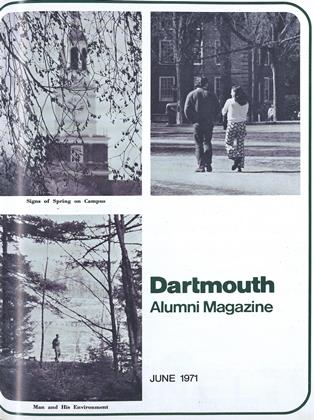By ElmerMunson Hunt '95. Peterborough (N.H.): Noone House, 1970. 282 pages, 6 maps$5.95.
If ever there were a lifetime's ambition eventually satisfied by a labor of love, this book is ample evidence. For many years the author, as Director of the New Hampshire Historical Society and sparked by his curiosity about all phases of New Hampshire history, probed into the facts behind the naming of the Granite State Towns and Unincorporated Places.
After the author retired from his several years of service with the Society, many of his articles on New Hampshire town names were published in the Manchester UnionLeader until his death in 1968. These newspaper columns are the basis for much of this posthumous book.
It was a prodigious task. There are 235 incorporated towns and cities in the Granite State and some two dozen unincorporated places, but each has a proud name that the author documents with adequate detail.
Although the writer's comments can stand on their own, a useful adjunct is the introduction by William L. Bauhan, which is really a capsuled history of colonial New Hampshire. Then it was that the two Went-worth Royal Governors, Benning (1741-1767) and his nephew, John (1767-1775) granted and named over half the Granite State towns.
As the author points out, "The Went-worths were responsible for no fewer than 152 charters establishing new towns in New Hampsihre and 128 in what is now Vermont (then part of New Hampshire), thus providing homes and farms in the hitherto undivided and unpopulated two million acres in northern New England for more than thirty thousand families." And all this before the age of typewriters and computers!
The significance of place names is always interesting. This book reports how towns have been named for literary figures, for jumping-off places in the "old country" in Europe or southern New England, for Biblical locations, for classical sources, for military heroes and, of course, for the Indians and politicians.
Mr. Hunt had a lifetime career in journalism and advertising before he took his last and symbolic stand at Salisbury. Then followed eleven productive years (from 1944 to 1955), when he researched the endless papers and records condensed in this book.
Unlike many others, Elmer Hunt did more than talk about his own theme. He wrote about it, and in permanent and enjoyable prose for the many who will forever be indebted to him for sharing with them his keen interest in New Hampshire Town Names.
Mr. Monahan is College Forester, Emeritusof Dartmouth College.
 View Full Issue
View Full Issue
More From This Issue
-
 Feature
FeatureMan and His Environment
June 1971 By ALVIN O. CONVERSE -
 Feature
FeatureRETIRING FACULTY
June 1971 By B.B. -
 Feature
FeatureWhat Price Clean Air?
June 1971 By Robert B. Graham '40 -
 Feature
FeatureTeaching at a Communist University
June 1971 By NOEL PERRIN -
 Feature
FeatureThe Marxist View of Overpopulation
June 1971 By Charles W. Collier '71 -
 Article
ArticleA Second Life Through Heart Surgery
June 1971 By Daniel L. Dyer '39
ROBERT S. MONAHAN '29
-
 Letters to the Editor
Letters to the EditorLetters to the Editor
APRIL 1978 -
 Article
ArticleAn Outdoor Adventure of 1778
May 1954 By ROBERT S. MONAHAN '29 -
 Books
BooksTOMORROW'S BIRTHRIGHT.
January 1956 By ROBERT S. MONAHAN '29 -
 Feature
FeatureA Tuckerman Tradition
April 1956 By ROBERT S. MONAHAN '29 -
 Article
ArticleMt. Washington Diary Presented to Library
December 1959 By ROBERT S. MONAHAN '29 -
 Article
ArticleGuardian of the Grant Retires
March 1962 By ROBERT S. MONAHAN '29
Books
-
 Books
BooksFaculty Publications
December 1935 -
 Books
BooksCHALLENGE AND PERSPECTIVE IN HIGHER EDUCATION.
MAY 1971 By ARTHUR E. JENSEN -
 Books
BooksALBERT INSKIP DICKERSON: SELECTED WRITINGS
November 1974 By JAMES L. FARLEY '42 -
 Books
BooksMILL TOWN.
November 1954 By MALCOLM KEIR -
 Books
BooksThe Back of My Mind
DECEMBER 1966 By Ramon Guthrie -
 Books
BooksTHE UPLAND GAME HUNTERS BIBLE.
May 1961 By SIDNEY C. HAYWARD '26


